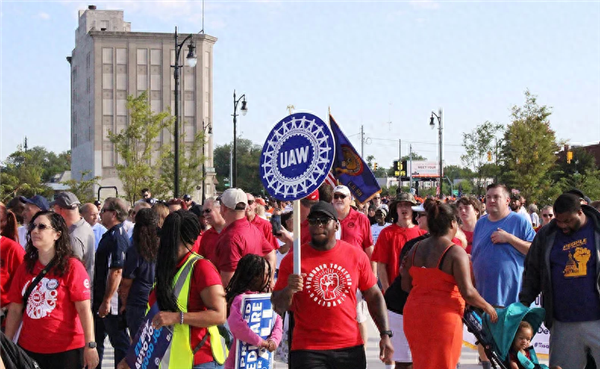
Recently, the United Auto Workers (UAW) organized about 150,000 American auto workers to launch general strikes in multiple states in the United States. This is the first time in the history of the UAW that a strike has been launched against three major U.S. car companies at the same time. It is also one of the strongest strikes in the United States in recent years. This has brought a major test to the U.S. auto manufacturing industry.
Organized by the United Auto Workers (UAW), auto workers demanded a 40% wage increase and defined benefit pensions from U.S. auto companies. This request was rejected by the Big Three. General Motors' top manufacturing executive, Gerald Johnson, said the UAW wage and benefit proposals would cost the automaker $100 billion. This is almost more than twice the total market capitalization of General Motors and is absolutely impossible to accept. However, this time the UAW is very tough, prepared and will not give up until it achieves its goal. Why did the UAW choose this time to strike? There are three main reasons:
First, the U.S. election is about to begin, and neither the Democratic Party nor the Republican Party dares to offend the labor unions at this critical moment. Offending the union means offending the votes. The U.S. auto union is very powerful, and Biden can only play soy sauce on both sides, persuading both parties to reconcile as much as possible, so that while the auto companies can improve benefits, the union can also lower its demands.
Second, the union has prepared enough funds for this strike to fight a tough battle with the three American auto giants. American labor unions have three major sources of funding: First, membership fees. The second is government funding. The third is enterprise economic subsidies. In preparation for this general strike, the United Automobile Workers Union has prepared $825 million. All workers participating in the strike will receive an emergency living allowance of US$500 per week, and temporary medical expenses during the strike can also be borne by the union. It can be seen that this strike is a process of fighting for financial resources. See who can bear the greater loss, then give up.
Third, U.S. auto companies are at a critical moment in their transition to electric vehicles. The three giants Ford, General Motors, and Stratis have fallen far behind Tesla, China, and South Korea. During this period of pain, the strike will undoubtedly slow down their transformation process and instead strengthen the market advantage of rival Tesla. However, in the face of the increasingly fierce market competition, if we agree to the union's demands at this time, it will be tantamount to cutting off our livelihood. The UAW's punch hits the pain points of automobile companies, putting them in a dilemma.
In addition, this strike also exposed some shortcomings of the union system. As an important part of the American manufacturing industry, American labor unions were originally established to fight for and safeguard the rights and interests of the working class and to solve problems faced by workers such as poor working conditions and insecure welfare. However, with the development and growth of labor unions and their increasingly powerful voices in the political arena, American labor unions have now become a "conservative" group that restricts the development of domestic manufacturing in the United States, seriously hindering corporate decision-making and innovation efficiency. In order to safeguard and maintain the interests of union members, American unions do not even allow American automobile companies to introduce new technologies to improve efficiency. For example, in order to avoid the closure of traditional engine plants and fuel vehicle assembly plants, the UAW has previously publicly opposed the U.S. auto industry's shift to electric vehicles. It can be seen that the UAW is just a microcosm of the American union's obstruction of electrification transformation. In the new era of electrification and intelligence sweeping the automobile industry, this is obviously not a positive signal. The negative impact of this strike and the substantial increase in manufacturing costs , not only weakening the competitiveness of the three giants, but also dealing a heavy blow to the U.S. automobile manufacturing industry.

Since 2022, the Fed has cumulatively reduced its balance sheet by $2.4 trillion through quantitative tightening (QT) policies, leading to a near depletion of liquidity in the financial system.
Since 2022, the Fed has cumulatively reduced its balance sh…
On December 11 local time, the White House once again spoke…
Fiji recently launched its first green finance classificati…
Recently, the European Commission fined Musk's X platform (…
At the end of 2025, the situation in the Caribbean suddenly…
The U.S. AI industry in 2025 is witnessing a feverish feast…